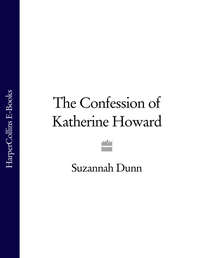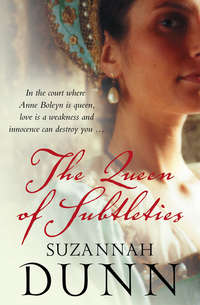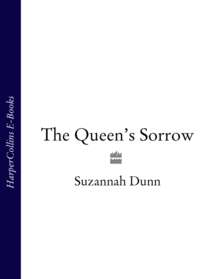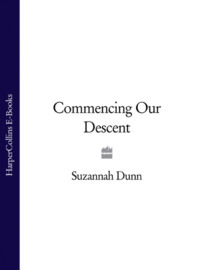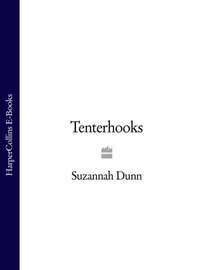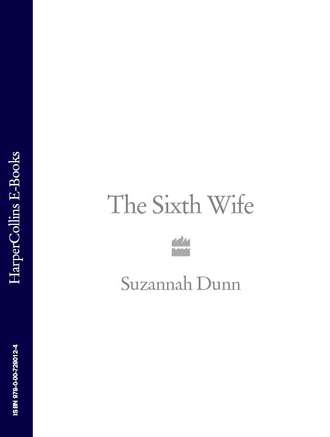
Полная версия
The Sixth Wife
Ah, yes, Kate and her strays: Henry would have liked that. He liked to have a compassionate wife. In his opinion, women should be compassionate. And he should, of course, have the best, the most compassionate woman.
So, it was Kate’s doing, and she seemed to have done it easily: the immediate saving of one life, the far-sighted saving of the children’s future so they didn’t have to grow up motherless and the saving of her brother’s sanity. I don’t know that I’d have been bothered about the latter. For a man who was pursuing the axe for the woman whom he’d married? Or indeed any woman, any person. But then I don’t have a brother. I was – am - an only child. Out on a limb, from the beginning. Which is how I like it. I’m fond of Charles’s earlier families – his daughters, their children – but glad not to be tied to them. Now that Charles is gone, my boys are the only family I have. Keeps it simple, I suppose, albeit fiercely so. Kate was like a sister to her many stepchildren. I was no more than a girl when my boys were born, but there has never been anything merely sisterly in what I feel towards them.
Kate pleaded well for her brother, and did it so that he didn’t have to know, so that he could get on with recovering. Eventually we did have with us once again a good-natured, if emotionally bruised, Will: calming down and slowly turning back into an eligible bachelor.
In the meantime, though, Kate had wanted me over at her house. She wanted help with her reluctant house guest. Entertainment for her, or at least distraction. Although Kate didn’t say as much, I knew her own ladies weren’t up to it, being an unworldly bunch. No outsiders could do it because although everyone knew where Annie was, she had to be seen to have disappeared. No one else could visit. I wasn’t included in that, never am; I do what I want. I didn’t, though, want to do this. I’d never known Annie; we’d moved in different circles. So, it was a succession of strange afternoons and evenings that I spent at Kate’s, sometimes playing cards or more often doing nothing at all. Annie clearly wasn’t in the mood for fun and games, or indeed for anything. Kate and I exhausted ourselves coming up with chatter while avoiding mentioning anyone’s name or anything that was happening to anyone, be it trouble or triumph, because we simply didn’t know what might be sensitive for Annie. She probably didn’t give a damn what we said. She’d sit well back in her chair, arms folded hard and high, making the barest of necessary responses. It was impossible for me to know what she was usually like, even how she’d usually look, this shadowed-eyed, unsmiling woman. What was obvious, though, was that she was furious: her sullenness was suppressed fury. Directed at everything and everyone, would be my guess. And whatever we did, and however we tried, Kate and I probably came into that, even if it was against Annie’s better judgement, and I’d like to think it was. I’d like to think she was grateful to Kate and understood that we were on her side, but I suspect she couldn’t help hating us. Well, we were ladies bountiful, weren’t we. That’s how it must have seemed to her. Everything was all right for us.
Whenever I think of her now, what I recall is the slow drumming of her heels against the legs of her chair, the very sound of desolation and defiance. I’ve been thinking of her a lot recently. You know what I think? I wonder whether perhaps her situation wasn’t all that bad, in the end.
She was long gone by the autumn. She’d done her time at Kate’s and had moved on to her new life – children in tow – with that lover of hers. And we were busy doing our best for Will. For Lizzie Brookes.We were at our best, perhaps, then, Kate and me. Girls together again. It was harmless fun. It was cosy. It was easy. Kate, being Useful; me, my views on love well known. Kate, convert. Me, old hand.
Old hand? I have to tell you: that’s not how I felt, as I watched Will and Lizzie fall for each other. It had been so different for Charles and me. There’d been no mystery, for us. We did fall in love, yes, but only when we were married. Risking nothing. Not that our marriage was any less for it. On the contrary. But watching Will and Lizzie, I found myself wishing that I’d gone through what they had to endure. I was so very sure, then, that autumn, that I would never know what it is to have one’s head turned and be held there, breath taken. Not to know quite what one was in for.
Twelve

It was a cosy, carefree autumn, that autumn; insular and frivolous, the autumn that was Kate’s last. We met up as usual for the feast day of our namesake: St Catherine, on the twenty-fifth of November. Because we were outspoken on the need to rid religion of folklore, we had to keep it secret, this annual exception that we made. Which suited us fine. It was ‘our day’, and our ‘feast’ was exactly as we alone wanted it: steaming bowls of furmenty, the wheat-thickened, cinnamon-scented milk, chewy with dates and raisins; and our rich cream dowcet crusted with burned sugar. We sat at the fireside with our bowls in our laps, gossiping.
November became December and suddenly – or so it seemed to me – Kate had gone to Sudeley for Christmas: gone home for Christmas, gone to her new home. Sudeley was at last ready and she seemed to leave London without a backward glance. But Christmas for those of us who remained at or close to court was fun, as usual. My boys were particularly impressed, loved being in the thick of things, acting as if none of this – the feasts, masques, music – had ever happened before and had been contrived especially for their benefit. Full of it, standing tall, they seemed to be growing in front of my eyes and I saw them, for the first time, as stars of the rising generation. True, they’d been Knights of the Garter for almost a year, since the coronation, when Harry had walked behind Eddie, carrying the orb, but I’d never taken it seriously. They’d been my little boys, nominally in attendance on a nominal boy-king. Playacting. Last Christmas, though, was a revelation: I saw them shaping up for their future as right-hand men to their monarch. Following in their father’s footsteps.
Just after Christmas, I caught a bad cold and delayed my journey back to Lincolnshire. Three days on the road would have been quite beyond me. Taking to my bed for a few days, I missed a lot of the usual London New Year celebrations although I did manage to make an appearance for the gift-giving. My boys had been easy, this year, wanting money. And, despite the expense, I was particularly pleased with the cloth-of-tinsel doublets that I’d had made for the senior members of the household. Bella seemed delighted with her red silk purse. And her present to me was a little bag, too, this one for holding lavender: Holland linen, which she’d embroidered gorgeously. To Kate, I’d sent a length of that new, bobbin-made lace; and she’d sent me a beautiful gold brooch of a bee.
Still unwell, I missed the only event that had promised to liven up the lull after Epiphany: Kate’s brother’s marriage to Lizzie Brookes. Kate, too, missed it, for the same reason: she was ill. I’d assumed that her illness was similar to mine; there was a lot of it about. She felt slowed up, she wrote to me, and was sometimes sick. Well, the sickness I didn’t have. She’d picked something up, she said, and couldn’t shake it off. Her next letter mentioned she was no better. It’s dreary, she complained: I’m bored and boring and poor Thomas must wonder what on earth he’s married.
Ah, yes, poor Thomas. A third letter came with him on one of his trips to London but he didn’t deliver it to me in person, sending it instead via one of his men. In it, among news of family and friends, were the words I’m still wretched, a bit of a wreck.
I didn’t like the sound of that.
I’m coming, I wrote back. I was fine by then. I need a good look at you, I told her. Writing those words, I was remembering how well she’d looked when I’d last seen her. This was cruel, whatever it was, keeping her laid so low when she was at last ready to live life to the full. In her letters she’d been deliberately offhand, but I suspected she was worried. How could she not be?
Don’t, came back the message. Don’t come, don’t worry. I’ll be fine, I’ll sleep this off. It’s a bad time of year for getting better, that’s all. And a look is definitely not a good idea. I warn you now, she declared: I look awful.
She knew I’d come. I’m coming, I replied. No arguments. I’ll be no trouble, I’ll keep myself to myself, but just let me see you. I need to see you.
And perhaps it’s true that this was as much for my sake as for hers, and perhaps that’s why she let me come. Everyone knows I’m no nurse. I’m hopeless with sickness, my own or anyone else’s – even my boys’, it hurts and shames me to say.
At times during the days before I set off to see Kate, I was frantic with worry about her; but at other times, I managed to reassure myself that it was a bad time of year and hardly anyone was fully well. Plague was around – Elizabeth and Jane’s tutor, William, had died of it, Kate told me, during his trip home at Christmas – but there had been no cases anywhere near Sudeley and, anyway, whatever this indisposition of Kate’s was, it clearly wasn’t the plague. Come spring, I told myself in my good moments, she’ll pick up. In the bad moments, though, I wondered: a day or two of sickness could be put down to bad food; and a week, well, it happens, particularly at this time of year. A couple of weeks of being unwell, even: yes. But this? This sickness for weeks with no let-up?
Конец ознакомительного фрагмента.
Текст предоставлен ООО «ЛитРес».
Прочитайте эту книгу целиком, купив полную легальную версию на ЛитРес.
Безопасно оплатить книгу можно банковской картой Visa, MasterCard, Maestro, со счета мобильного телефона, с платежного терминала, в салоне МТС или Связной, через PayPal, WebMoney, Яндекс.Деньги, QIWI Кошелек, бонусными картами или другим удобным Вам способом.


